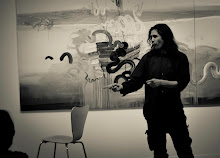Deleuze says somewhere in 'Difference and Repetition', that Philosophy is all about encounters with Demons. To meet a philosopher adequately is to be taken on a witch ride, transforming your thought, allowing you to think differently, or at least to understand how you are already thinking differently. A maxim that is even more true when the philosopher one encounters is firmly 'part of the history' of philosophy. For history has its own power to create in us, thought. To study a past thinker is therefore not just to encounter their actual thought, but also the echoes and cadences of their thought today. So that one encounters both how these ideas affected subsequent thought, and so informed (or not) our thinking. And also how the debates, circumstances, and experiences that created the original thought find echoes in today's event. Repetitions that allow one both to understand the original afresh, but also in the process, allow different ways to comprehend what is happening now.
Demons, which merge past and present, and shift one's understanding of the future, are the stuff of the history of philosophy. A discipline that asks us to understand how the concepts and experiences that populate and mould our minds were originally not our own, and are never simply truly 'ours' alone. The material of stand up philosophy places one in a curious place. One is drawing on the works from the history of thought, and so in a sense running up against, and conjuring up these worldly demons, and one's performance must reflect that. At some point, there must be a feeling that something is breaking through or breaking out, a feeling of shifting, being challenged, where one is risking something possibly precious, and we are not sure what we will gain in return.
This much perhaps could be said of all performance art. But what makes Stand up Philosophy a little different is that the rhythm of the performance, is caught up very directly with the ideas one is communicating. Ideas are therefore not lurking beyond the performance or underlying it, but are very much centre stage, and the performance must echo, and reflect the 'demonic' lines by which the ideas reach back into the past, but also into our minds, and the way in which we grope towards a future. Good stand up philosophy orchestrates this thought by any means, be it by humour or audience participation, poetry or tragedy.
To perform philosophy, is therefore to allow an idea to really be understood for what it is. Ideas are not something there to be thought and done with, understood and so completed. They are rather strange pathways blending any times and multiple problems, making demons of and in all of us. For the history of philosophy done properly is really a demonology, and to perform it, an act of evocation.


No comments:
Post a Comment